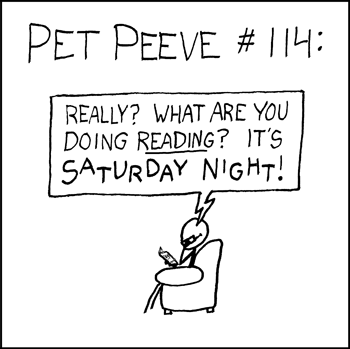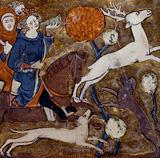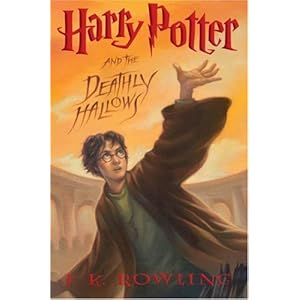I’ve found something I really enjoy to write about this week, and I personally feel like it’s germane to the topic. Like many in
this class, I’m sure, I love reading.
It’s one of my favorite pastimes; I can easily spend hours curled up
with a good book. Who doesn’t look
forward to cold, stormy winter days when you can sit by the fire and read à
volonté? Okay…so maybe I’m a little
unique. Still, I’m betting most of us
love a good book.
 |
| I'm reading a book, that's what I'm doing! credit to: xkcd.com |
I started trying to learn more about the history of novels, and I found that it is much more complicated than I had thought. There were few specific histories of novels, so I did a little digging and put some things together and made a few inferences. In other words, I am liable to be completely wrong, but this is part of what I learned.
There were several different kinds of literature
in antiquity. The difficulty of copying
books made it so that only important things (mostly things to do with the
Church, like copies of the Bible being made for priests and such) were written
down and copied as books. The first
literature that resembled what we would call a novel began to appear sometime
in the 11th or 12th century. According to a few sources, the first ‘novel’
was written around the year 1010 in Japan.
Europe followed behind, and by the mid-12th century, it seems
that romances were becoming popular among the educated and those wealthy enough to afford
books.
There are a few things I have found
interesting about these romances. I am
taking a French Literature class, and we are discussing the 12th
century romance Erec et Enide by
Chrétien de Troyes, which recounts one tale of the legendary round table of King
Arthur. Since we happened to be
discussing a similar time period in this class, I’ve been paying very close
attention to the way in which it is written.
One thing that strikes me is that, besides the fact that the language is
in a much older style, the book reads much like any novel about the Knights of
the Round Table. There’s a very skillful weaving of sword fighting, courtship,
romance in the modern sense, unexpected plot twists, and yet more sword fighting,
as if de Troyes really knew what his audience was after in a book.
 On the other hand, there are some marked
differences between his book and the ones we are used to seeing. For one thing, I felt like there was still an
almost oral quality to the book. The
original was written in verse, not prose.
There were long lists of persons either belonging to or otherwise
attached to the Round Table that felt very formulaic, as did some of the descriptions
of the fights. I couldn’t find any
analysis elsewhere, so I am not sure if these are sort of ‘left-overs’ from the
oral traditions of the past, or perhaps de Troyes was himself introduced orally
to these stories, rather than being their author; personally I prefer the
former idea.
On the other hand, there are some marked
differences between his book and the ones we are used to seeing. For one thing, I felt like there was still an
almost oral quality to the book. The
original was written in verse, not prose.
There were long lists of persons either belonging to or otherwise
attached to the Round Table that felt very formulaic, as did some of the descriptions
of the fights. I couldn’t find any
analysis elsewhere, so I am not sure if these are sort of ‘left-overs’ from the
oral traditions of the past, or perhaps de Troyes was himself introduced orally
to these stories, rather than being their author; personally I prefer the
former idea.
It is also interesting to consider the lack
of a ‘master’ or ‘authorized’ copy. When
the book was first written, there was one definitive copy, but as soon as it
was handed off to others to copy, small changes began occurring. There is evidence in the remaining
manuscripts that later translators or transcribers even went so far as to edit
portions that they didn’t like or that they thought could have been phrased
better. I own an edition of the book
that allows you to compare the differences in the few surviving manuscripts we
have, and while the basic storylines are the same, there are occasionally
surprising differences; in one translation, Enide’s name isn’t given until
halfway through the play, in another they never refer to her as anything
else. In effect, after a certain amount
of time, if two people read the ‘same’ book, they might have in fact read two
very different stories
I will resume this topic at a later date, hopefully in a supplementary post this week, if I can
manage to find time. In the meantime,
what does everyone think? How would
things be different if I had read a different Harry Potter than you?


Nice post Brett! I had never really thought much about the different types of writing that were developed after the practice of writing itself came about. And to (not really) answer your question I think that we already to read "different" versions of books like Harry Potter. Of course the text is the same, but you and I would probably put more significance to different parts and remember those better or differently than someone else. So I think the general effect of the story as a whole is different for everyone.
ReplyDeleteHey just so you know the first novel was titled, The Tale of Genji. It was possibly written by a noblewomen named Murasaki Shikibu. If this is true then the first novel was written by a women. That is pretty interesting because society was definitely a male dominated society at that time.
ReplyDeleteI remember reading Romeo and Juliet my Freshman year of high school. Our book had the original version as Shakespeare had written but also had a modernized version of writing. The left side had the Shakespeare version, the right the other. It was interesting to compare the two as I read the story. I don't know if I would have been able to understand or have a different perspective of the story if I had only read one of the versions without the other. I definitely think how a book is written does alter what we gain from it.
ReplyDeleteThanks, Montana! Actually, I did know that; if you click on the link "sources" that's hidden in my post, you'll see that it goes to a website all about the Tale of Genji. :)
ReplyDeleteTanner, you're definitely right, we do already read books differently; imagine how much more our readings would differ if there were actual contextual differences in the script!
Shuan, it's interesting that you would mention reading a copy of 'Romeo and Juliet' that includes the original text; the edition I'm reading of 'Erec et Enide' actually has the original texts in an old form of French on one page, with the modern translation, identical to your book. I just wanted to mention that the old French is remarkably different, *almost* unintelligible for a modern French speaker. In fact, it was a different language with a different name at the time; instead of 'français', it was called 'Romanz', and that's the origin of both our word 'romance' and the idea of French being the 'language of romance'!
ReplyDeleteBut, like I said, that's coming later in another post. :)
In modern society, we often think of written texts as being definitive sources. If there is a disagreement (about Harry Potter for example) then we can just look it up and be done with it. But if I had read a different version where my scribe had decided that Harry should end up with Hermione, then Harry Potter fans everywhere would be offended when I talked about them getting together. :P
ReplyDeleteNow that becomes even more interesting when we consider that the most important books of the time were the sacred texts. What would happen if my Bible taught something slightly different than yours? Then we'd have a very difficult time agreeing on the "correct" doctrine wouldn't we?
Jake's comment reminded me of a PBS show I once watched when I was younger. I think it was Reading Rainbow. Anyways, one of the episodes featured a story about a boy that wore a hat where on one side it was red and the other was green.
ReplyDeleteWell this boy took a stroll down a busy street. There were townspeople on either side that watched this boy walk along and took note of his hat. One side only saw the red while the other only saw the green. This led to an argument of epic proportions. (silly right?) All because each side believed what they had specifically perceived.
This principle can be applied to what texts we read. Like the different versions of some children's stories. Someone may read the Disney version of Cinderella while another may read the Grimm Brothers' version. Both have essentially the same basic plot, but both have a deviated storyline from one another.